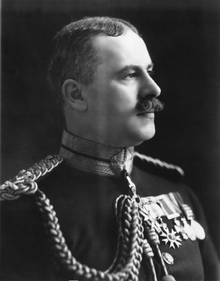Eugène Fiset
Sir Eugène Fiset | |
|---|---|
 | |
| 18th Lieutenant Governor of Quebec | |
| In office December 30, 1939 – October 3, 1950 | |
| Monarch | George VI |
| Governors General | The Lord Tweedsmuir The Earl of Athlone The Viscount Alexander of Tunis |
| Premier | Adélard Godbout Maurice Duplessis |
| Preceded by | Ésioff-Léon Patenaude |
| Succeeded by | Gaspard Fauteux |
| Member of the Canadian Parliament for Rimouski | |
| In office September 2, 1924 – December 30, 1939 | |
| Preceded by | Joseph-Émile-Stanislas-Émmanuel D'Anjou |
| Succeeded by | Joseph-Émile-Stanislas-Émmanuel D'Anjou |
| Personal details | |
| Born | March 15, 1874 Rimouski, Quebec, Canada |
| Died | June 8, 1951 (aged 77) Quebec |
| Nationality | Canadian citizenship |
| Political party | Liberal |
| Spouse(s) | Zoé-Mary Stella Taschereau, daughter of Thomas Linière Taschereau |
| Relations | Jean-Baptiste Romuald Fiset, father |
| Alma mater | Laval University |
| Occupation | physician, military officer |
Major-General Sir Marie-Joseph-Eugène Fiset, KCMG, DSO, ED (March 15, 1874 – June 8, 1951) was a Canadian physician, military officer, Deputy Minister of Militia and Defence, Member of Parliament, the 18th Lieutenant Governor of Quebec, and the 3rd Canadian Surgeon General.
Early life
[edit]Born in Rimouski, Quebec, the son of Jean-Baptiste Romuald Fiset and Aimee Plamondon, Fiset was educated at Rimouski College and received a Bachelor of Arts degree and M.D. from Laval University.[1]
Military career
[edit]He joined the 89th Temiscouata and Rimouski Battalion of Infantry at the age of 16. His military career continued during his studies, he was promoted to the rank of lieutenant while a student. In 1899, he succeeded his father as surgeon to the 89th Battalion but, a few months later, joined the Second (Special Service) Battalion of The Royal Canadian Regiment with the rank of major and saw service in the South African War.[2] For his service in the war, he was appointed a Companion of the Distinguished Service Order (DSO) in the October 1902 South African Honours list.[3]
With the end of his tour of duty in South Africa in 1900, Fiset interned at the Nose and Throat Hospital in London and L'Hôpital Saint-Antoine in Paris.[2]
After a year he returned to Rimouski before becoming an adjutant in the Royal Canadian Army Medical Corps. In 1902, he was part of the Canadian Coronation Contingent for King Edward VII's coronation and travelled to the United Kingdom as the Surgeon-Lieutenant of The Royal Canadian Regiment. In 1903, he was promoted to the rank of colonel and became Director-General of the service.[2]
Fiset was promoted to the rank of Surgeon General (Major General) at the beginning of World War I.[4][5][6][7][8] He was knighted for his service in the war while the French government named him a Commandeur of the Legion of Honour.[2]
Political career
[edit]He retired in 1923 and began a political career sitting in the House of Commons of Canada as the Liberal MP for Rimouski from 1924 until 1939.[2] He served as Deputy Minister of Militia and Defence.
On December 30, 1939, Fiset became Lieutenant-Governor of Quebec. On two occasions during the war he opened the legislative assembly wearing his major general's uniform in order to express support for the war effort. He remained in office until October 1, 1950.[2]
See also
[edit]References
[edit]- ^ "A history of Quebec, its resources and people, vol. 2". Internet Archive. 1908.
- ^ a b c d e f "Sir Eugene Fiset returns to service…". Canadian Military Heritage. Archived from the original on 25 October 2007. Retrieved 8 February 2007.
- ^ "No. 27490". The London Gazette. 31 October 1902. p. 6909.
- ^ Macphail,Sir Andrew. "Official History Of The Canadian Forces In The Great War 1914-19 - The Medical Services" Archived 22 May 2013 at the Wayback Machine, Ottawa, 1925. (Retrieved on 18 February 2012).
- ^ Seventy Years of Service – A History of the Royal Canadian Army Medical Corps, G. W. L. Nicholson, Borealis Press, Ottawa, 1977
- ^ Sir Eugene Fiset. Quebec Daily Telegraph, August 5, 1924 page 1. (Retrieved on 18 February 2012).
- ^ H Castell Hopkins, F.SS., F.R.G.S. "Canadian Annual review of Public Affairs", 1914. (Retrieved on 18 February 2012).
- ^ Walford, Edward. "The county families of the United Kingdom; or, Royal manual of the titled and untitled aristocracy of England, Wales, Scotland, and Ireland", 1919. Volume ed.59, p. 129. (Retrieved on 18 February 2012).
External links
[edit]- 1874 births
- 1951 deaths
- Canadian Knights Commander of the Order of St Michael and St George
- Canadian military personnel of the Second Boer War
- Canadian generals of World War I
- Commanders of the Legion of Honour
- Liberal Party of Canada MPs
- Lieutenant governors of Quebec
- Members of the House of Commons of Canada from Quebec
- Surgeons General of Canada
- Université Laval alumni
- Canadian Militia officers
- Canadian military personnel from Quebec
- People from Rimouski
- Canadian generals
- Royal Canadian Army Medical Corps officers
- Canadian federal deputy ministers
- 20th-century members of the House of Commons of Canada
